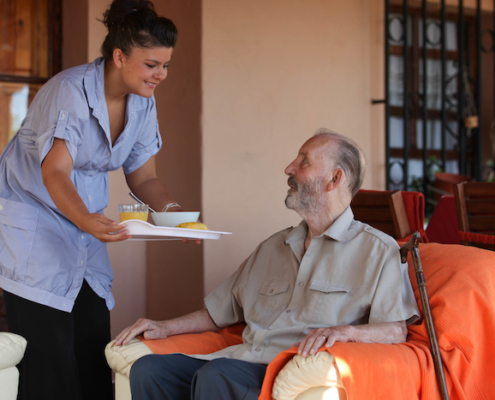by Joyce Warner
I recently sat down with Monica Moreno, Senior Director, Care and Support, at the Alzheimer’s Association to talk about how to start a conversation with and then help a loved one at the onset of memory issues and cognitive decline.
Joyce: Monica, thanks so much for speaking with me today. I think many families find it hard to speak with a loved one about potential cognitive decline they might be observing. What makes this harder to discuss than other age-related health issues?
Monica: Many people often go to the worst-case scenario when facing these conversations. Most of us do. Alzheimer’s and other dementias are long, progressive, ultimately fatal diseases — and nobody knows what their experience will look like. Opening the door to that conversation can be scary for everyone involved. Having this conversation makes it harder to ignore what is happening.
It’s also challenging when family members do not agree on what they’re seeing and are hesitant to have the conversation as a result. In some cases, family members may be in denial. Getting everyone on the same page can be challenging, but it’s worth the effort. The sooner you talk to someone about the changes you’re noticing, the more likely it is that you’ll be able to get your loved one the care they need and engage them in the process.
Joyce: What are early warning signs of cognitive decline that signal a need for conversation?
Monica: People know one of the most common signs of Alzheimer’s is memory loss, but there are other warning signs to look for, including judgment, mood, and executive functioning. For example, if you see a family member struggling with day-to-day tasks they used to do easily, like making a familiar recipe. Difficulty with words—getting lost mid-conversation and finding it hard to get back on track—is also common. Misplacing items and being unable to trace their steps to recall where they were is another sign. Finally, withdrawing from social gatherings and activities someone used to enjoy can be a red flag.
Some memory changes can be a normal part of the aging process, but when changes start to interfere with daily living or stray drastically from the person’s normal behavior, it is best to get it checked.
Joyce: What are the key things to consider when talking to a loved one about cognitive concerns? Do you have some tips on planning the conversation?
Monica: It’s important to have the conversation as soon as you notice changes. The sooner you talk to your loved one, the better your chances of engaging them in their care. People living with early-stage Alzheimer’s or dementia are more likely to have some self-awareness of what is happening. When someone has less insight into what’s going on (more likely in later stages of the disease), they cannot be as much of a partner in their care.
It’s also good to get your family on the same page beforehand. If you’re worried about one of your parents, talk to your other parent, siblings, or anyone else your parent is close to and share your concerns. Ask if anyone else is noticing the same signs you are and remember that spouses often cover for one another. Discuss who is best to have the conversation. Ideally, choose someone your loved one will listen to and trusts.
In terms of the conversation, be honest and compassionate. Start by sharing some of the things you’re seeing and asking if your loved one is also concerned. “Mom, we were worried when you forgot to show up at your grandson’s birthday, and I’d like to talk to you about why that happened because it’s not like you.” You don’t want to come at someone and bluntly say, “I think you have Alzheimer’s.” Focus on specifics, share them in a way you think your loved one will be able to hear it, and let them know you have their back.
FEDLIFEHACKS Talking About Memory Loss Issues
[Video Start]
[Video presented with written slides in English]
[music]
[FEEA #FEDLIFEHACKS logo with a light bulb at the top encased by a blue box.]
Talking to a Loved Ones About Memory Issues>
[An image of an older white man sitting in front of a puzzle at a table looking confused with his hand to his forehand]
[An image of a white an older white woman looking down with her hand to her forehead looking confused.]
Starting the Conversation Can Be Scary
- Alzheimer’s and other dementias are long, progressive, ultimately fatal diseases – and nobody know what their experience will look like.
- But getting your loved one the care they need sooner is worth the effort.
[An image of an older black woman and a younger black woman seated looking at a photo album.]
Some Early Warning Signs:
- Memory Loss
- Struggling with day-to-day tasks
- Difficulty with words
- Withdrawing from gatherings/activities
Drastic behavioral changes are a sign to get things checked out
[an image of a younger Asian man hugging and older Asian man.]
Tips on Planning the Conversation
- Have a talk as soon as you notice changes
- Get family members on the same page ahead of time
- Be honest and compassionate
[An image of an older white man speaking with a Black doctor wearing a white coat and stethoscope.]
What if Talking Doesn’t Go Well?
- Take time to regroup.
- Try a different time of day, or recruit someone else to talk to your loved one.
- Ask your loved one’s doctor to talk to them about the signs of cognitive decline you’ve noticed.
[An image of an older Black couple picking apples with a young Black boy]
Benefits of Early Diagnosis
- Persons with dementia can be more involved in making care decisions
- Possibility of medications and clinical trials
- Better understanding of what the future may hold, so affected person can make decisions about what’s important to them now.
for more information on this topic, visit feea.org/memory-talk
The Federal Long Term Care Insurance Program logo.]
FEEA thanks FLTCIP for contributing to our #FedLifeHacks program
[FEEA #FEDLIFEHACKS logo with a light bulb at the top encased by a blue box.]
[music]
[Video End]
Joyce: What are some traditional next steps after you have the conversation? What if the talk doesn’t go well and the person is resistant?
Monica: The goal of any conversation about cognitive decline is to get the person the help they need. Next steps should include seeing a doctor for further evaluation and a proper diagnosis. It may also include discussing changes to keep your loved one safe, including potentially sensitive issues such as should they be driving? Is it still safe for them to live alone?
Conversations like these can be difficult because they threaten the person’s autonomy and independence. Recognize you may need more than one conversation before change occurs. If your first attempt doesn’t go as well, take time to regroup. You might try a different time of day, or recruit someone else to talk to your loved one, perhaps a different family member, friend, or a trusted person from your church or faith community. You could also share your concerns with your loved one’s doctor and make a request: “The next time my dad comes in, can you talk to him about these signs of cognitive decline?”
Most importantly, remember that there is no perfect way to have this conversation. Make a plan, and understand you may have to revise it.
Joyce: Since there is no cure, what are the benefits of early diagnosis?
Monica: The earlier the diagnosis, the more you can involve the person living with dementia in conversations about their care and future planning. You can discuss with them how to handle various situations—like what to do if long-term care becomes necessary — and steps you’ll take that everyone can agree on. These types of decisions are empowering for the person facing the disease, who may not be able to make them later.
An early diagnosis will also give you the opportunity to talk to your doctor about the best way to manage the disease. Some current medications may help address disease symptoms. Earlier this year, the FDA approved a new drug that is the first shown to slow disease progression, offering hope to those living with mild cognitive impairment (MCI) and early-stage Alzheimer’s disease. In addition, clinical trials might be an option that can offer access to new treatments and ongoing care.
An early diagnosis lets the person know what they are facing. It gives the person more time to learn about the disease, understand what they might need, and discuss future care plans with their family. In wake of a diagnosis, many individuals make significant changes in how they live their lives, choosing to focus on the things most important to them. This can be a real gift.
Joyce: What resources are available to help?
Monica: The Alzheimer’s Association has incredible resources to support individuals throughout the disease spectrum — from identifying early warning signs to end-of-life care and every point in-between. We have education programs, support groups, and disease-related information resources that can be helpful both for people living with Alzheimer’s and their caregivers. The Association also offers a free 24-7 helpline (1-800-272-3900) to help families navigate disease-related challenges.
It’s understandable families may be worried about initiating conversations about cognitive decline, but it’s important to remember that if you’re noticing signs, speaking up in a loving and supportive way is a true gift. If federal employees are facing this difficult conversation, please know the Alzheimer’s Association has resources to support you.
Federal employees have another resource available to them, and their eligible family members, an optional benefit for Federal Long Term Care Insurance (FLTCIP) that was established by Congress in 2000 and is overseen by the U.S. Office of Personnel Management. If approved, and depending on the policy selected, FLTCIP can offer coverage for in-home care, care by friends or family members, adult day care, home modifications, care coordination, caregiver training, assisted living and nursing care facilities. Like most insurance, you have to enroll before you need it.
More from FEEA
Subscribe to FEEA’s Newsletter
FEEA thanks FLTCIP for contributing to our #FedLifeHacks program
The information provided in this piece is for your convenience and informational purposes only and not to be construed as professional advice. FEEA and its coauthors and sponsors are not liable for any losses or damages related to actions or failure to act with regard to the content in this piece.
Would you like to reprint this piece in your agency human resource, federal employee association, or union local newsletter? You can do so at no cost by contacting admin@feea.org with your request.












